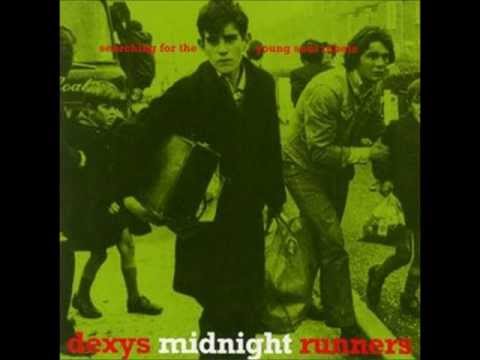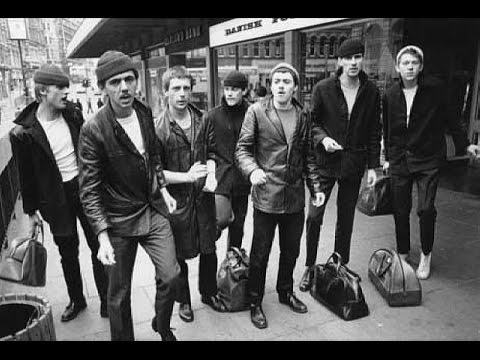My first non-‘Eileen’ encounter with Dexys Midnight Runners came after I dug out a load of old magazines from my uncle’s closet in rural Michigan, among them were dusty copies of Rolling
Stone and the inimitable Detroit-based rock mag, Creem. There was a review in a 1981 issue of a newly imported UK hit album which scribe Mitchell Cohen took a bash at. It seemed that when it came to Searching For The Young Soul Rebels, something was lost in cross-pond translation, the less than favourable review rounding up on the statement:
“If there never is another Dexys Midnight Runners LP, it will not be cause for grief. Searching For The Young Soul Rebels, which went to the top of the pops in England (naturally), is a one-off of such ambitious foolishness that it should forever stand alone. Invest now in a 1993 collectors’ item.”
A hit and a miss in hindsight here. There was indeed a follow up to Searching, and it was arguably more ambitiously foolish than its predecessor in its adoption of Celtic folk stylings,
abandonment of brass for bows and accompanying dungaree-donned straight-off-the-pig-farm look. This resulting album, Too-Rye-Ay, was oddly enough – and likely to Cohen’s chagrin – a massive No 1 hit in the US and was the biggest selling record of 1982 in the UK. However, this would shove the seedling that was Searching under the shadow of a massive oak, only receiving
secondary recognition after Too-Rye-Ay, when it should, indeed, stand alone.
They were another one of those groups that proved too idiosyncratic for the North American mainstream, committed to American music memory as lowly one-hit wonders and – worse –
those dudes prancing about in overalls, sniffing their armpits, and appearing in dire need of a wash… or, indeed, fumigation. However, in the UK they’re musical marmite: sure it tastes like
pureed tree bark marinated in sea salt – or in this case twisted oblong copper-zinc alloys soaked in sweat – but people will enjoy it with neither shame nor superiority, apathetic to the grimaces of a co-listener.
Affable – bordering on laughable – soul with the dysentery of punk, Searching, and indeed Dexys, is oft cited as a link between the anarchic music of the late 70s and the distinctly un-
visceral 80s New Romantics, attempting to bridge the chasm between these two wildly different subcultures – along with Billy Idol of Generation X and Adam Ant, Dexys leader Kevin
Rowland was one of the punk singers that genre jumped after punk imploded, disbanding then-group The Killjoys to form Dexys. But unlike the other groups that may fall into this description
– such as the tribal pop of Bananarama and Adam & the Ants, or the 2-Tone movement – Dexys do not wade into either extreme. The turnaround was minimalism vs. hedonism, amateurism vs.
artifice, grit vs. glitter. Dexys were none of these, for better or worse.
In many ways, Rowland’s voice was the embodiment of that straddled position – he had neither the smoothness of Gaye nor the grating affect of Rotten, but you would be hard pressed to find a voice more emotive. It conveys alternately and simultaneously determination and desperation and, through all of the changes Dexys would go through (in both line-up and music), gives continuity to an otherwise schizophrenic catalogue. The sobbing style was conceived specifically by Rowland to set him apart, and though it may have put him up for parody to a degree, it is a small price to pay for the instant recall and nostalgia now evoked by his timbres in whatever setting they appear.
Many would admit there are bands whose greatest work is produced as the product of volatile musical partnerships which seem likely to tear asunder at any given moment, and the great
thing about Dexys was that this was the perpetual temperament of the group – mostly due to Rowland’s notorious inability to play nice with others. By the time Searching reached great success, Dexys Mk 1 had already dissolved. The restrictions that were placed upon the group were maddening, they weren’t allowed to stay in hotels due to their inherent ‘temptations’, drinking and drugs on the night of a gig were strictly prohibited aside from the alcoholic trombonist who was allowed half a bottle of whisky and not a drop more, plus, an embargo on talking to any and all UK music press confused an enraged the more practical of Rowland’s rebels. The final straw came when Rowland insisted on the single release of his uncommercial and obsessively insecure ‘Keep It Part Two (Inferiority Part One)’ (included on the 30th anniversary reissue of Searching). The single flopped and the group split apart to form other bands including The Blue Ox Babes and The Bureau (including ex-Merton Parkas keyboardist Mick Talbot who would go on to form The Style Council with the newly Jam-free Paul Weller).
With these members never to return, neither would the original Dexys sound. Thus Searching For The Young Soul Rebels is a one-off, the self-contained nugget of a genre only barely ignited – that of the working soulmen. Not to be overly grand about it, but it’s comparable to the inception of rock & roll – white people attempting to copy their favourite black music and failing. Gloriously.
The record opens with ‘Burn It Down’, the reworking of original Dexys single ‘Dance Stance’, which kicks off with squealing radio frequencies – featuring linear snippets of Deep Purple,
Sex Pistols and The Specials – after which Kevin shouts at Jimmy (Paterson, trombone) and Al (Archer, also called Kevin, but alas there could only be one!) to “burn it down” before launching
into a soul-inflected ode to the Irish victims of ignorance – dropping names like Oscar Wilde, George Bernard Shaw and Laurence Sterne.
Instrumental ‘The Teams That Meet in Caffs’ goes on a bit, but is worth enduring as the following ‘I’m Just Looking’ proves itself an absolute jewel in Kev’s madcap crown. Never are his sobs more shoulder shifting or the brass interjections more dramatically staccato. Icy organ sends chills as Rowland moves from eerie whispers to rolling Rs and exasperated bellows,
giving the warning “Don’t come any closer” a sense of exhausting urgency – even on one of the record’s most downbeat tunes (timing only matched by ‘I Couldn’t Help It If I Tried’).
The only track coming close to being this moving is album closer ‘There There My Dear’, an open letter to what Rowland perceives to be a dishonest music scene. “Perhaps I’d listen to your
records but your logic’s far too lame,” Rowland laments. “And I’d only waste three valuable minutes of my life with your insincerity”. Although the track begins akin to a Bar Kays jam sesh, horns build melodrama amongst another dabbing of literary name dropping until it culminates in a breakdown of rising action where Rowland bewails the vanishing of the young soul rebels over chugging bass, sustained organ and mournful horns.
Number one single and homage/tribute to R’n’B singer Geno Washington ‘Geno’ is a raucous and welcome change from the emotional drainer that is ‘I’m Just Looking’, accounting
Washington’s influence on young punter Rowland (“After a week of flunking and bunking school/The lowest head in the crowd that night”) and matching the man’s Ram Jam Band punch for punch. The influences showcase continues with a cover of Northern Soul classic Chuck Wood’s ‘Seven Days Too Long’ that would not have been out of place spinning at the Wigan Casino, chugging along at speeds allowed by the Dexys’ namesake amphetamine.
‘Thankfully Not Living in Yorkshire It Doesn’t Apply’ is another beast entirely from the rest of the album. It’s completely incomprehensible, but irresistibly fun with playful organ, daft
falsetto and a lovably silly “ooh ooh, aah aah” chorus. To be honest, I haven’t the foggiest what it’s about, or what the title has to do with anything, but the song suffers little for it. Spoken word piece ‘Love Part 1’, however, is silly for the wrong reasons, the single moment of pretentiousness that Rowland probably should have kept to himself.
If you’re a lover of the first incarnation of Dexys then the 30th Anniversary reissue of Searching For The Young Soul Rebels (again, Mitchell Cohen was not wrong!) is unmissable.
It accounts the entire recording career of the gang from ‘Dance Stance’ right up until ‘Plan B’ and includes tinny alternate takes, John Peel sessions and romping covers of soul classics
like ‘Respect’, ‘Hold On! I’m Comin’’, ‘Soul Finger’ and ‘Breaking Down The Walls Of Heartache’ (though three versions of this may have been overkill). The added tracks provide context for the influences and instability of Dexys Mk 1 that is not known to be needed until experienced.
Although Rowland’s later transgressions may make him difficult to respect entirely (the middle-aged man in silk negligee, thong, thigh-highs and comb-over singing ‘Concrete and Clay’
simply cannot be unseen) they are unable to dampen the independent fling that was the first Dexys Midnight Runners’ one and only record and probably one of the best debuts the UK has
ever seen.





